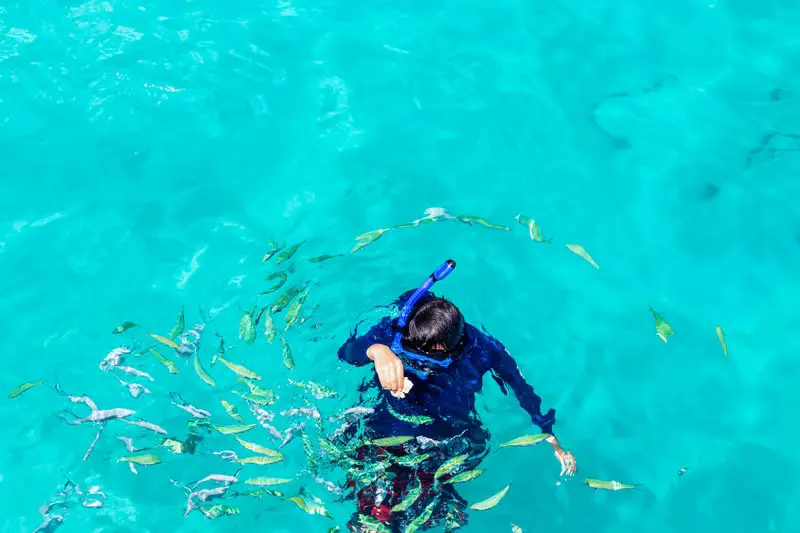
A thought that probably crossed every snorkelers mind, is whether or not to bring some food for the fish. It’s a fair question since a tasty snack will most likely result in more surrounding marine life.
So, should you bring some food for those cute little swimmers? Or maybe not? Let’s find out.
Advantages Of Fish Feeding
Attract Fish (Obviously)
The most common reason to bring some food when snorkeling is to attract a whole bunch of fish. Especially the shy species that normally stay away from humans. You know there’s an eel below that rock, but it just won’t come out. Maybe a little treat will do the trick, right?
Photography
Others will find their joy in photography. If you have an interest in making underwater pictures or videos, who doesn’t want to capture a colorful marine life on camera? If you’re interested in underwater photography, feel free to also read our giant guide for snorkeling with a GoPro.
Kids
If you go snorkeling with kids, you might hear yourself thinking “I hope there are some beautiful fish for them to explore”. Well, with some help you could achieve that goal pretty quickly. Especially if the marine life is limited, and kids get bored easily, you could find yourself doing some research on fish food.
Feeling Good
Whether you go snorkeling or not, some people feel good about sharing treats with animals. Let’s say it’s a cold day, it’s raining, and fish come to the surface to grab some fresh air. It’s a perfectly normal thing to feel “pity” for them.
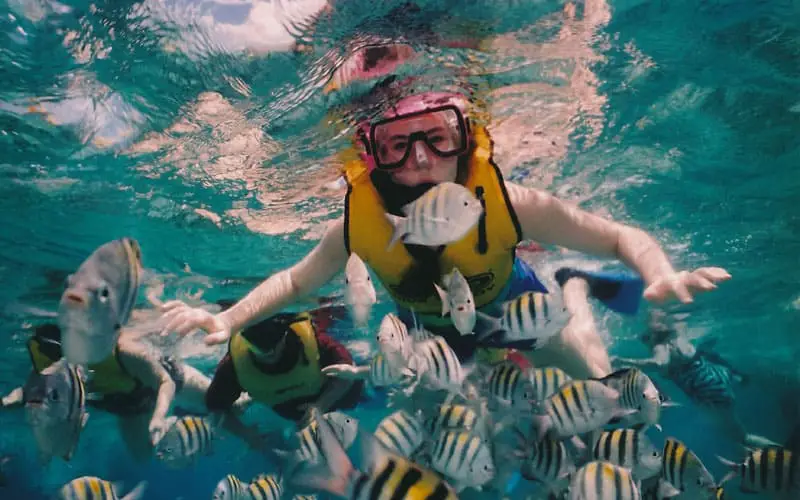
Fish Food Sticks For Snorkeling
Probably the most famous product in this category are the fish food sticks. We don’t suggest you to buy some if you haven’t finished reading this article. However, if you’re curious, here’s a link to Amazon to give you an impression.
The product has to be released in the ocean water after which it will slowly sink. This gives fish the time to recognize the object and to understand it’s actually a snack. On it’s way to the ocean bottom the magic will already happen. Make sure to stay in shallow waters in order to get the best out of the experience.
This food in particular claims to be fully biodegradable, which is a way to avoid pollution. The whole stick, including it’s protein film, can be eaten by marine life according to the manufacturer.
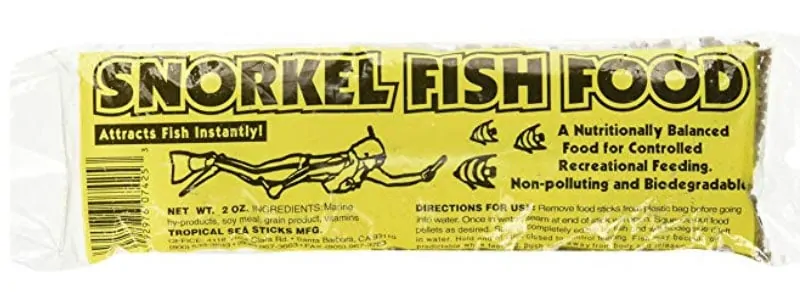
Disadvantages Of Fish Feeding
Unnatural Diet
There are about 20.000 different fish species that habitat our oceans. Some of them prefer to eat other fish, some rather have plants, some a combination of the two, some coral polyps, some worms or eggs, some invertebrates, some algae, you name it. In other words, fish don’t all have the same diet.
This means that most fish species have a different digestive system. It’s part of their evolution. Some surgeonfish for example prefer to eat green hair algae. If that’s their daily diet, what will happen if they eat something you bought in a supermarket? Will they get sick or maybe even die? Sure, fish can be hungry, but they know how to deal with that. And they should.
Most of us have fed a few ducks in our lives, right? Well, did you know that’s actually unhealthy for them? The same goes for fish. Bread is a human made product that contains yeast. It expands after consumption which can really hurt some of those cute little fellows. Even worse, they could die. Therefore, never ever feed bread to the fish (or ducks, or a whole lot of other animals).
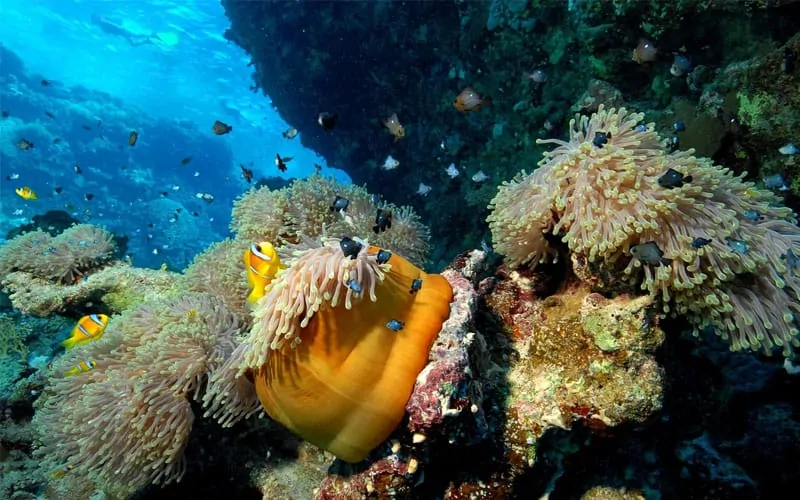
Biodiversity
Within the ocean there is a so called “biodiversity“. This means there is a certain amount of flora and fauna within a particular habitat. Preferably this keeps itself in balance without any human interruption. It allows fish to breathe, eat, and drink from a self-evolving ecosystem.
Feeding fish when snorkeling can absolutely have an impact on the marine life’s ecosystem. You’re not only adding food to their environment, which doesn’t belong there in the first place, but you’re also disrupting the purpose of the fish within that ecosystem. Compare it with the food chain.
Let’s give you an example. Some fish solely live from eating algae. Algae grow in a whole lot of places. Having some kind of “cleaning service” from local fish is a natural process. They don’t like algae by coincidence, it’s part of the ecosystem. If these fish wouldn’t eat algae, other invertebrates might not be able to live on certain underwater rock formations. Let’s say a butterflyfish lives within the same area, looking for invertebrates, what would he or she do without this food source? Would they manage to survive in the long run?
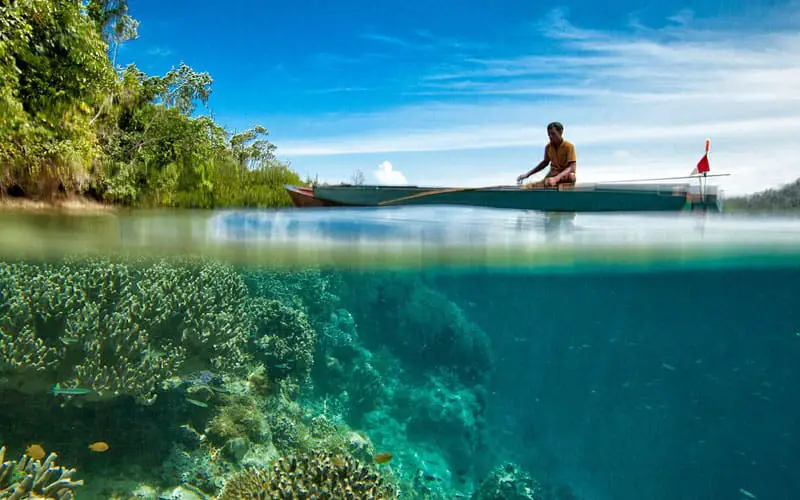
Expecting More Food
A big downside of touristic beaches is the risk of creating a “food location” for fish. It doesn’t matter if you bring snorkel fish food or any other type of treat, fish will start to get dependent.
In nature, fish need to look and sometimes fight for their food. That’s why certain fish only come out at night when other fish are asleep. They all have their own little tricks.
So why would we interrupt that genetic behavior? It happens all the time that fish just move to a different territory because there’s “free food” every day. They’ll leave their original territory, thus negatively influencing their ecosystem, and finally being dependent on us humans.
Becoming Prey
Fish need to learn how to catch food in order to survive. They need to understand that the ocean can be dangerous. Nothing is for free, and if you don’t watch your back, you could become prey yourself.
Fish get lazy if we feed them. They’ll just come to the shore for food and then call it a day. By forgetting about the “ocean rules” they will end up being lazy, and before you know it, another fish starts the attack.
In other words, fish that depend on human food have less chances to survive in the wild ocean. They forget about the dangers and how to defend themselves.
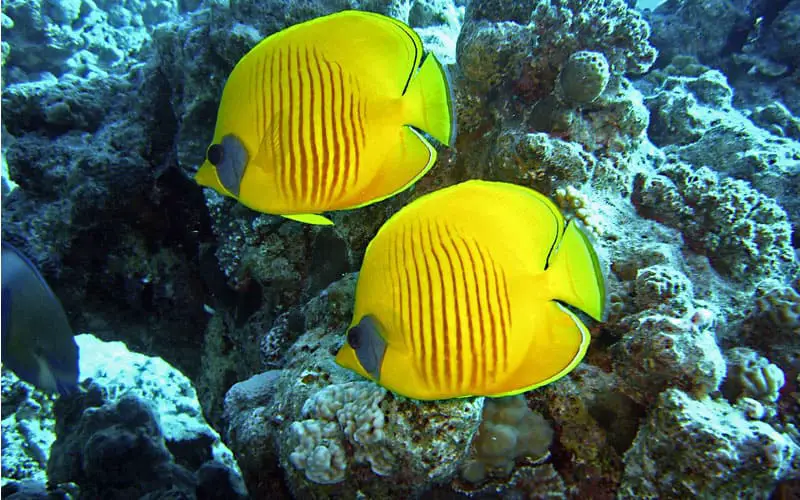
Becoming Aggressive
You might think these fish are so cute, eating the fish food you brought, but are they really? Remember, they are just here for a delicious snack. Not for you. For them it’s all about an easy meal, over and over again.
Soon they’ll start to associate people with a free dinner. They know you have some, and they know you (or anybody else) did the same thing yesterday. Just a matter of time until they can’t wait and things will start to look like a “piranha nightmare”. Not exactly fun for people that are a little scared to snorkel.
It doesn’t just end there. They will even bite you if you take too long to share whatever you brought with you. And even worse, when there’s no food at all, they might even bite a swimmer or snorkeler out of the blue. Simply because they associate us with a food source.
Final Thoughts
So, Should You Bring Fish Food On A Snorkel Day?
Definitely not. As fun as it might seem, please don’t feed the fish. Be patient when you go snorkeling and respect the ocean’s ecosystem. Appreciate whatever you discover in a natural way. Some days will be boring, others will be awesome. Always remember you are a guest.
So, How About Those Fish Food Sticks?
Like we mentioned, their specifications promise a fully biodegradable product that fish can consume completely. Yes, that is an awesome thing as we always need to keep the ocean clean. The problem might not be the product itself, but it’s effect on marine life.
Avoid fish food sticks when snorkeling because they negatively influence fish behavior. Besides becoming aggressive, their ecosystem will suffer greatly.
So, What If We Keep Feeding Them?
History has already shown that over time, certain species won’t be living in certain areas anymore. As a result, other fish need to migrate as well because they were dependent on these “neighbors” so to speak. It’s a shame if you visit a snorkel locations that greatly lacks some of the marine life it used to contain. Things would be way less fun without those pretty yellowtail or rare black and white fish, right?

